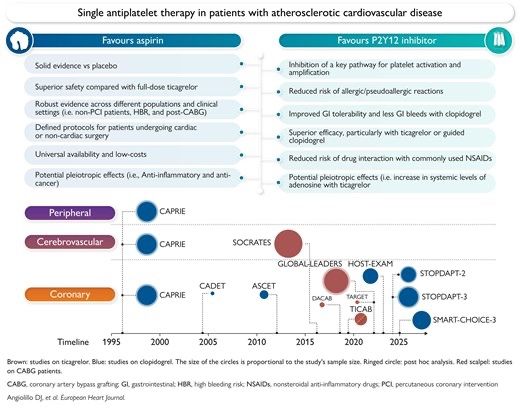
Ahmed Bennis on Potential Use of P2Y12 Inhibitors as Safer Alternative in Monotherapy
Ahmed Bennis, Professor of Cardiology at Ibn Rochd University Hospital, shared on LinkedIn:
”For over a century, aspirin has played a central role in cardiovascular prevention.
However, a major shift is on the horizon: P2Y12 receptor inhibitors, long reserved for acute phases, are now emerging as a potentially more effective and safer alternative in monotherapy.
This questioning of a historical pillar raises an essential question: should we rethink the basic antithrombotic strategy in atherosclerotic patients?
In light of new clinical data, the debate has never been more relevant.
This review analyzes data comparing monotherapy with aspirin to monotherapy with P2Y₁₂ receptor inhibitors in patients with atherosclerotic disease, suggesting that P2Y₁₂ inhibitors could be an alternative or even a preferred choice to aspirin.
• The authors examine the efficacy (reduction in cardiovascular events) and safety (risk of bleeding, variability of response) of these two strategies, highlighting the challenges of implementing monotherapy.
• They conclude that it is time to personalize long-term antithrombotic strategy in patients with atherosclerosis, as aspirin is no longer necessarily the only standard option.
Aspirin or P2Y12 inhibitor monotherapy in atherosclerotic cardiovascular disease?
Antiplatelet therapy is the cornerstone of management for patients with established atherosclerosis.
The use of a single antiplatelet agent is generally recommended for the long-term follow-up of these patients.
Although aspirin has been the mainstay of antiplatelet therapy for decades, recent data suggest that P2Y12 receptor inhibitors may be more than just an alternative to aspirin and may even be preferable to it.
This review examines current data comparing the efficacy and safety of aspirin and P2Y12 receptor inhibitors in reducing cardiovascular events in patients with atherosclerosis.
Particular attention is paid to the practical difficulties and considerations associated with the use of aspirin or a P2Y12 receptor inhibitor as monotherapy, including interindividual variability in response to the drug, adverse effects, costs, and implementation in clinical practice.
By evaluating the benefits and limitations of these therapeutic options, this article aims to guide clinicians in the optimal choice of antiplatelet monotherapy for long-term secondary prevention in patients with atherosclerosis.”
Read the full article in EHJ.
Article: Aspirin or P2Y12 inhibitor monotherapy in atherosclerotic cardiovascular disease?
Authors: Mattia Galli, Jurrien ten Berg, Marco Valgimigli, Davide Capodanno, Felice Gragnano, Takeshi Kimura, Deepak L Bhatt, C Michael Gibson, Roxana Mehran, Dominick J Angiolillo

Stay updated on all scientific advances with Hemostasis Today.
-
Feb 17, 2026, 09:04Mahesan Subramaniam: A Heart Attack Is a Long Story That Ends Fast
-
Feb 16, 2026, 15:44Lakmali Silva: Silva Lab Showcases Research at the Gordon Research Conference on Plasminogen and Extracellular Proteolysis
-
Feb 16, 2026, 15:36Heghine Khachatryan: Strengthening Maternal Resilience Against Postpartum Hemorrhage
-
Feb 16, 2026, 15:34Sevak Mirabyan: Advancing Cancer Care Through Knowledge, Collaboration, and Early Diagnosis in Armenia
-
Feb 16, 2026, 15:29Chokri Ben Lamine: Key Clinical Insights of Drug Induced Thrombocytopenia
-
Feb 16, 2026, 15:28Ney Carter Borges: Coronary Intravascular Lithotripsy – Clinical Performance and Safety
-
Feb 16, 2026, 15:24Flora Peyvandi: Highlighting Overdose, Homicide, and Suicide as Causes of Maternal Death in the US
-
Feb 16, 2026, 14:53Wafaa Abougabal: Differential Diagnosis of Acute Neurologic Deficits and Stroke in PICU
-
Feb 16, 2026, 14:49Nayab Ahmed: Synthesis of ATP and Its Significance in Storage of Blood

